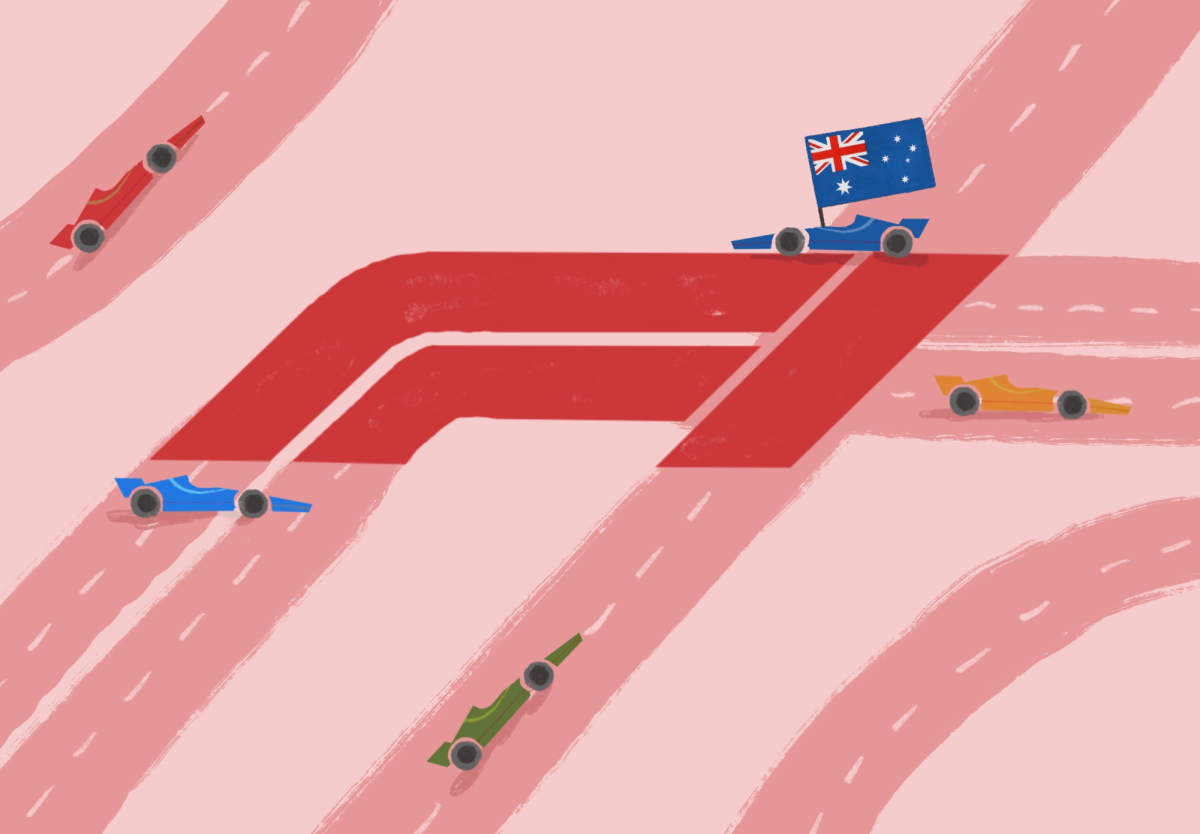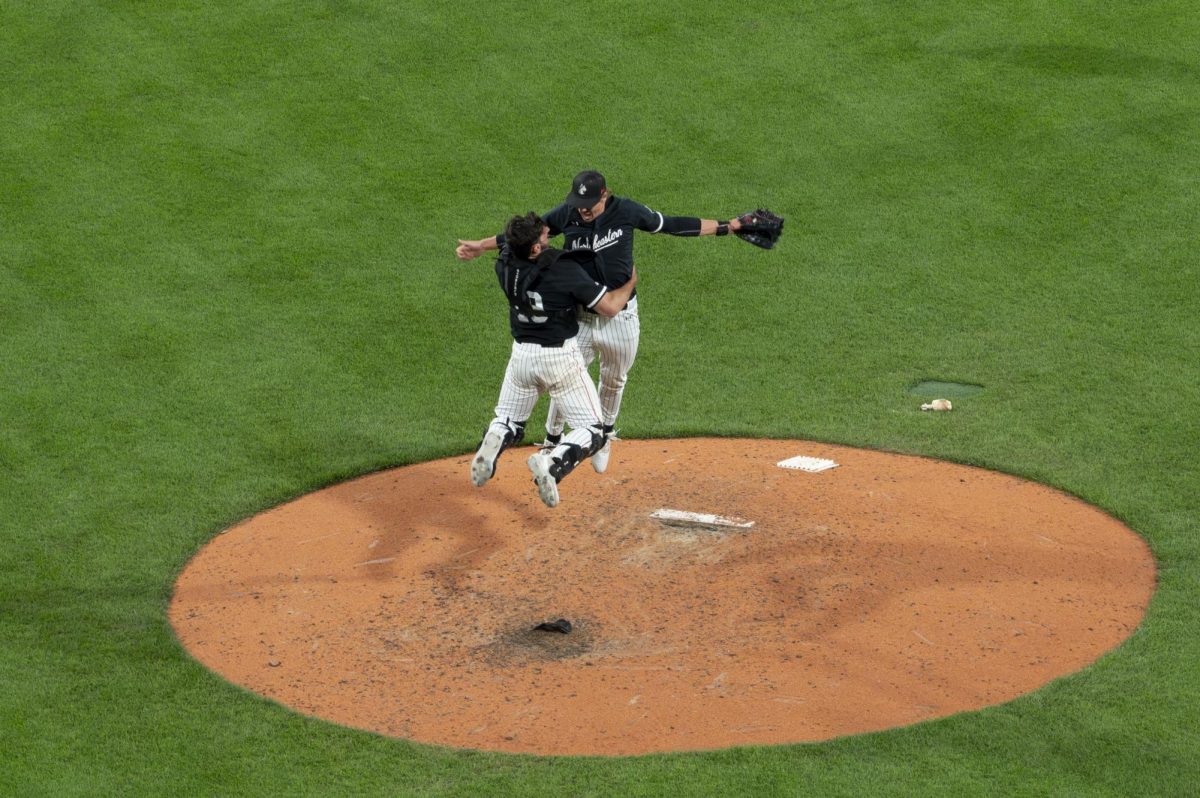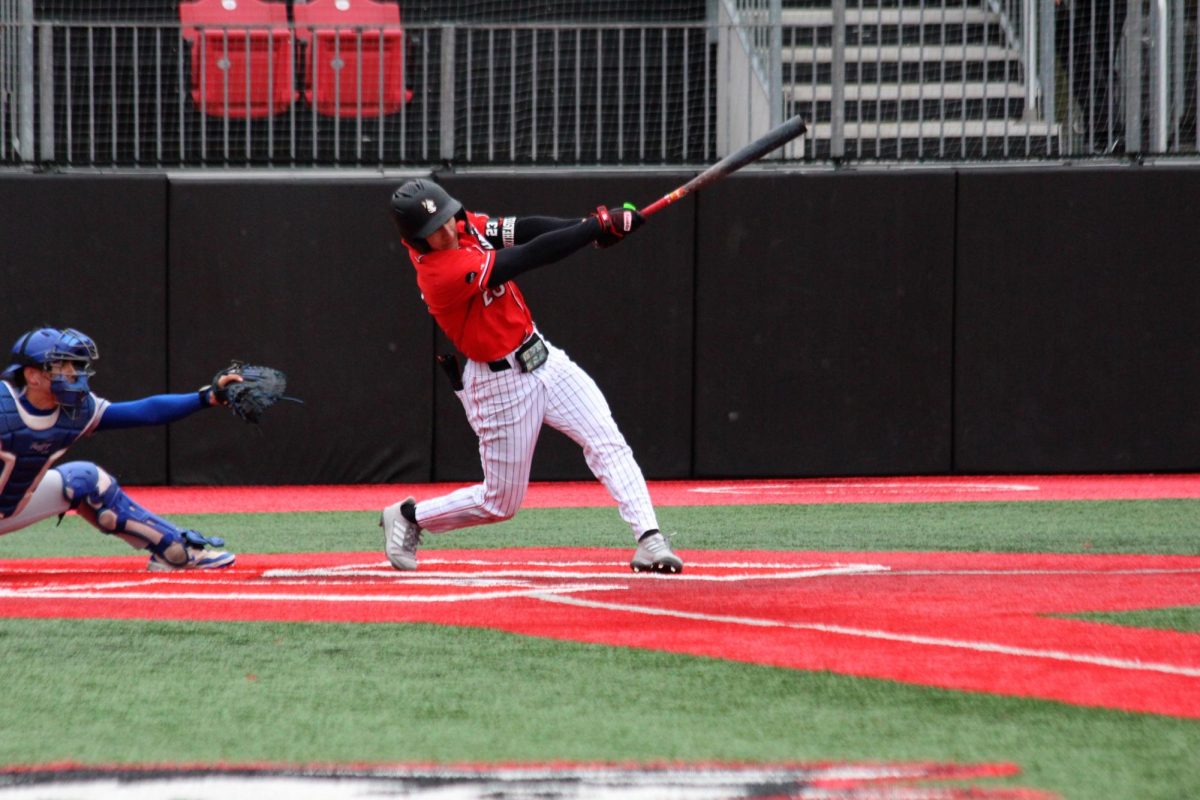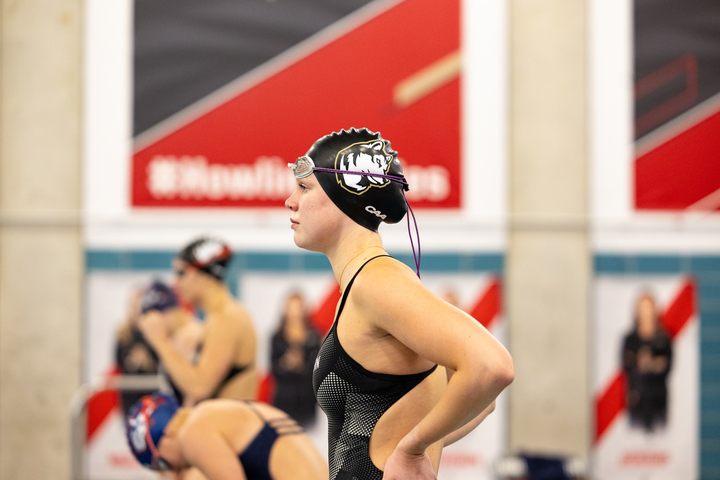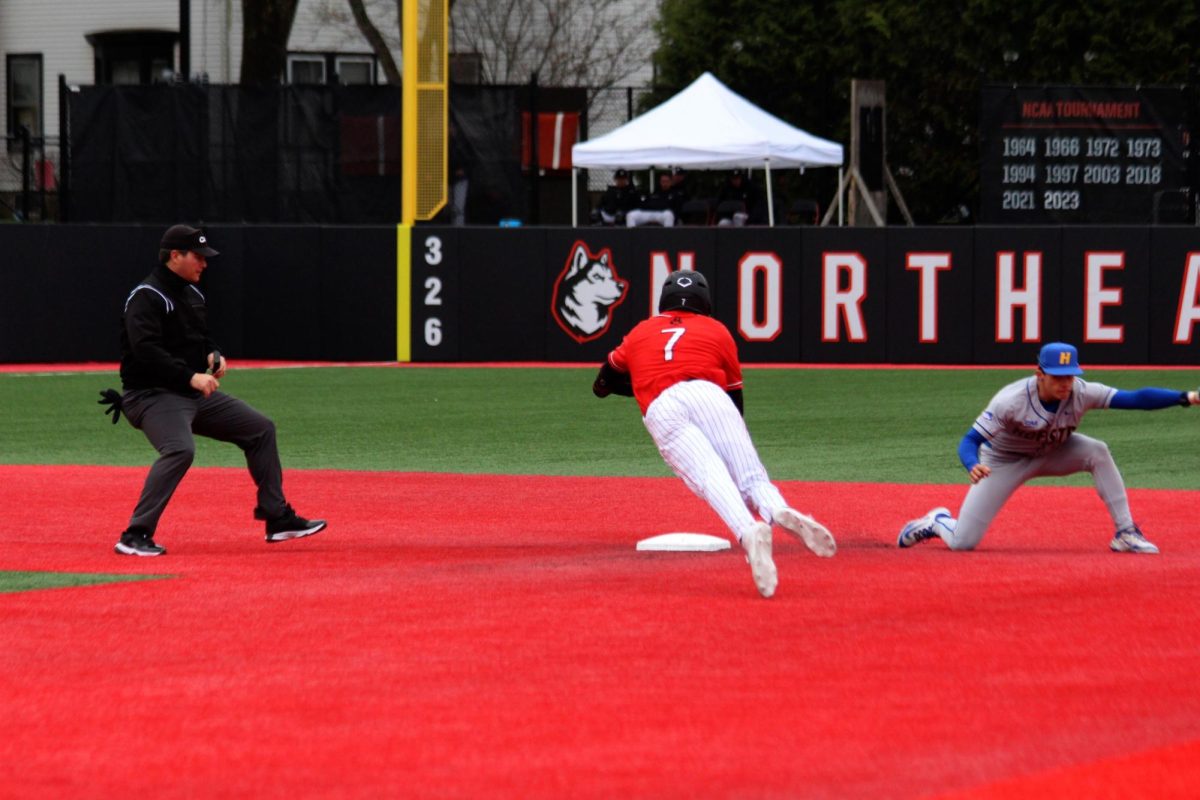For many student-athletes, their sports career ends when they walk the stage at graduation, but that’s not always the case — a select few get the incredible opportunity to play professionally and showcase their skills competitively, and another handful take the lessons they learned while on the team and apply them to the future of athletics in a coaching role.
At Northeastern, many coaches have a Husky degree in their pocket, each of them with incredible stories to tell about their collegiate experiences.
Joel Smith, Northeastern Men’s Basketball ‘13
Joel Smith, an assistant coach for the men’s basketball team, graduated from Northeastern in 2013. Growing up, the Austin,
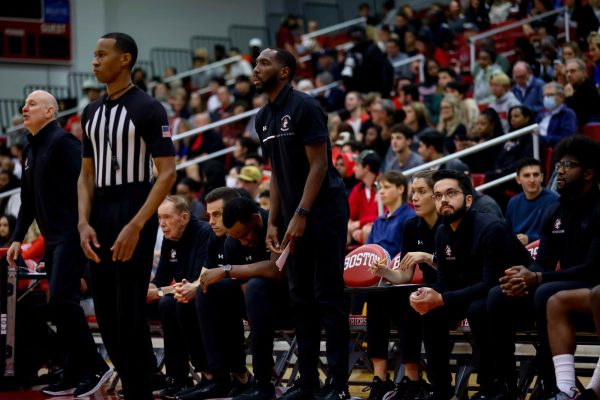
Texas native was unfamiliar with the Huskies, but head coach Bill Coen made a big impression on him and helped him make the decision to attend the far-from-home university.
“The major influence of bringing me to Boston was [Coen] calling and telling me about the opportunities here,” Smith said. “Right away, just from having a conversation with him, me and my mom had a good feeling about the type of person he was, what he stood for and what I was going to go off to do.”
On the court for Northeastern, he played in 27 games during his first year. In his second year, he averaged 12.2 points per game, starting in 26 games, and in his junior season, he was nationally ranked in three-point field goals per game. His last season included a Preseason All-CAA honorable mention, and he became the 31st player in Northeastern history to reach 1,000 points.
After he graduated, Smith spent two seasons (2013 and 2014) playing professional basketball in Argentina. He also averaged 16.0 points per game for Correcaminos UAT in Mexico.
“I think all that was due to preparation of making a decision to come to Northeastern and get away from a conference, really dive in and focus on how to work and how to compete. I learned a lot from Northeastern and took that with me professionally,” Smith said.
In 2015, Smith started his coaching journey at the University of New Haven in Connecticut. Meanwhile, he worked as the video coordinator for Northeastern’s basketball program and had the Huskies in the back of his mind as his end goal.
“I had reached out to [Coen] and was really interested in getting back to Northeastern full-time and getting into the Division I world again,” Smith said. “Things just kind of aligned. He’s a huge relationship guy, so it kind of worked out and it came together.”
Stepping back onto campus was a transition for Smith as his perspective shifted from student to coach.
“I’m obviously super familiar with the campus and how things work with some of the people that are still around, but there’s a level of professionalism you have to maintain and switch over from being a student to being an employee,” he said.
Being on the student-athlete side gave Smith a chance to shape his coaching and figure out how he wanted to come off to his team.
“I know the tireless amount of hours the coaches worked trying to prepare myself and my teammates for competitions, trying to get us prepared for how tough [each] season is year in and year out,” Smith said.”We want all our kids to feel loved and feel like we’re pouring into them as far as helping them.”
Most of all, he’s grateful for the chance to return to Cabot as a coach, taking all of his past experiences on the court and translating them into coaching.
“We don’t want to just be here for basketball, we want to be here for the life things. We want to be here for your accomplishments, [for] when you’re struggling,” Smith said. “I felt like I got there with all of my assistants. [Coen] hired us back and it speaks volumes to his character and what he believes, giving his former players opportunities like this.”
Tramaine Shaw, Northeastern Track and Field ‘09
Tramaine Shaw’s parents had no idea what Northeastern was when she started the college sports recruitment process almost 20
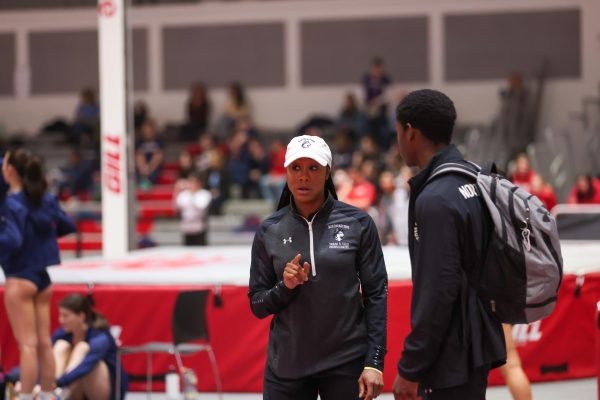
years ago. Boston was vastly different from the small town of Piscataway, New Jersey, where she grew up.
“I knew I would be successful at home, but I wanted to challenge myself to be [more] successful,” Shaw said. “I knew I’d be driven athletically here, but it also appeared that academics were just as important.”
Shaw’s 2005-2009 career ended with numerous program and conference records. Alongside her record-setting performances, she was named America East Rookie of the Year for indoor and outdoor seasons as a freshman. Northeastern left the America East Conference to join the Coastal Athletic Association, or CAA, in 2005, migrating over to a different competition pool. Through her other seasons, she won individual CAA titles, including a CAA Co-Most Outstanding Track Performer accolade in 2007 — when Northeastern won their first CAA title in any sport — and was named to the 25th Anniversary CAA women’s track and field team in 2009.
“There were teams who had no idea who we were. We actually got mistaken for Nebraska or Northwestern,” Shaw said. “But they knew who we were by the time we left.”
During her time as a track star, she managed to balance athletics with other parts of her life, spending time on both her degree and her social life. Practices were not consistent at Cabot, making it a bit chaotic for the team.
“It could get hectic, but everybody was enjoying each other’s company and focused on the goal of winning and running fast that any challenges almost seemed irrelevant,” Shaw said.
After earning her degree in psychology, she stayed near campus, never wanting to leave the familiar Boston grounds. She volunteered as an assistant coach during her fifth year for track and field, remaining a part of the team in a new capacity.
“It was good to be able to stay connected to the program but also have the freedom to not be an athlete anymore, and it was nice to see the other side of it,” Shaw said. “As a student-athlete, you only ever get to think about what your day-to-day is like, but you really don’t think about what your coaches have to do to prep.”
She continued to coach even after joining the workforce and was eventually asked by the head coach if she wanted to fill an assistant position.
“I thought I would stay on full-time until I got my master’s because I enjoyed it, but I never thought of coaching as a career. Before I knew it, I was still here, almost 15 years later,” Shaw said.
Stepping into the new leadership role, she sought to build herself and her team as much as she could. She spent nine seasons as an assistant coach and one season as the interim head coach (2017-18) as she worked her way up to becoming the director of track and field. Currently, she is the head coach for both track and field squads, plus the cross country teams.
“There’s so many pieces to what it takes to run an NCAA program and to coach. I felt like I was constantly learning, constantly challenging myself and trying to reach a new height,” Shaw said. “I think that’s what allowed time to just kind of roll by without even realizing that I’m still doing this.”
Under Shaw’s guidance, the track team has been a successful squad that only continues to improve — last season, she led the Huskies to its eighth-straight CAA men’s outdoor title. She also received the CAA Men’s Outdoor Coach of the Year Award for her fifth straight year. In 2017-18, Shaw produced men’s and women’s teams that won the CAA Outdoor Track and Field Championships, and she was named CAA Coach of the Year on both the men’s and women’s sides. It also landed her a spot in the Northeastern Hall of Fame in 2015, honoring her accomplishments as a student and a coach.
Throughout her journey, Shaw witnessed the changes the university has been making to advance the track program and the school overall, such as enhancing the general landscape and raising the bar for academic excellence. Most beneficial to the team has been more funding being invested into athletics, giving the next generation of athletes more opportunities.
“What we’re able to provide our student-athletes with is so much more than what I had access to, and it’s one of the reasons why I continue to coach,” Shaw said. “We really do learn as much from them as they learned from us.”
Shaw said it’s a special feeling to understand both sides, and coaching isn’t something many student-athletes get to pursue in their future endeavors.
“I know exactly how you’re feeling, I know exactly what you’re going through. I was there. Let me tell you what I’ve learned, let me tell you how to grow and how perception can change,” Shaw said.
She often gets asked when her tenure at Northeastern will end, given her uninterrupted decade-and-a-half stint at the university.
“The answer is, as long as I feel like I’m continuing to be invested in our programs and that I can continue to grow here. When I get to a point where I feel like I hit a wall or there are goals that I set and want to achieve that I absolutely can’t, that is when I will reconsider,” Shaw said.
Jason Guerriero, Northeastern Men’s Hockey ‘05
Jason Guerriero’s journey with Northeastern started in 2001 on the men’s hockey team. As captain of the team his senior year, he
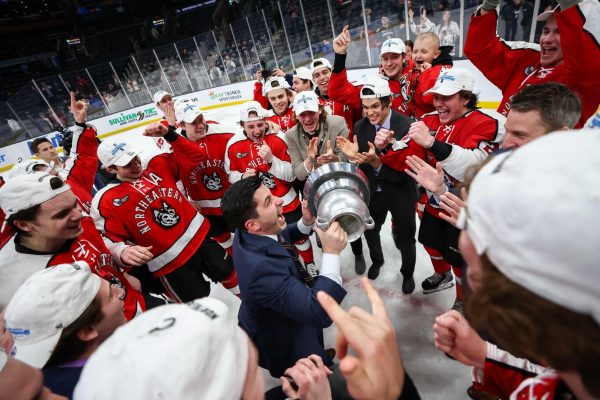
was the first-ever Northeastern player to lead Hockey East in scoring. Decked in First Team All-American honors, he posted 49 career goals and 147 career points and still ranks 13th among all-time Husky scoring leaders.
“I was very fortunate to play with some really good hockey players and enjoyed my time. A lot of it I credit to the guys that I played with and the coaches that I was surrounded with during my time,” Guerriero said. “It was arguably the best four years of my life.”
Although the squad was not as dominant while Guerriero was on the ice as it is now — the team did not win any Beanpot trophies or conference titles — he was still able to come back and help lead them to success.
“During my time, we were just an okay hockey team. We were average, middle of the pack, and the joke is after I left, it became a lot better,” Guerriero said.
Guerriero said his time at Northeastern was special to him for many reasons — it prepared him for a career, but it’s also where he met his wife, another Northeastern graduate. Additionally, he witnessed the rise of Northeastern’s student section, the DogHouse, which now packs the stands at Matthews Arena.
After graduating, Guerriero played professionally for six years. This included time with the AHL Milwaukee Admirals and overseas across Europe.
“I was a bit of a suitcase traveling around, but it was quite the experience,” Guerriero said. “During that time, I always wanted to coach, so I kind of was networking. Some injuries stopped me from playing and then I got into coaching immediately after that.”
His injuries took him off the ice and set him on the path of his blossoming coaching career. Jamie Rice, now a head coach at Babson College, was a mentor to Guerriero while he coached at Holy Cross, Yale and Brown. Then, when the opportunity arose to return to his Husky roots, he didn’t think twice.
“During that time, as a player in getting into coaching, I always wanted to get back here to Northeastern,” Guerriero said. “Here we are, I’m back at my alma mater. When I first started this journey 13 years ago, this is where I wanted to be.”
Nonetheless, he’s had just as impressive of a career as a coach. Guerriero was inducted into Northeastern’s Hall of Fame in August 2022, celebrating the legacy he began as a student and continues to lead with his coaching. He was also named to the USA Hockey staff for the Youth Olympics in 2024. As a coach, things he appreciated as a player are different now that he’s witnessing those things in his adulthood.
“In the years to come, and even when they’re older, maybe when they have families, they’ll look back and appreciate it even more. I think a lot of us do that as we get older; you look back and you appreciate the moments that you went through in your life,” Guerriero said.
And, of course, he finally won that Beanpot trophy last year.
“I’m just like a little kid in a candy store, being back in my alma mater and working hard to continue the success that this program has had and make these guys better every day,” Guerriero said. “I’m just thrilled to be here but I know I have a job to do and I’m excited for it.”


